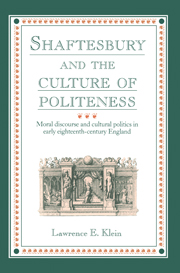 Shaftesbury and the Culture of Politeness
Shaftesbury and the Culture of Politeness Published online by Cambridge University Press: 13 March 2010
The notebooks
An Inquiry Concerning Virtue had certainly been completed by 1698, a year marking a rupture in Shaftesbury's life. Elected to the Commons in 1695, he was in the process of making a public name for himself. However, he refused to stand in the elections of 1698 in order to adopt a life of an entirely new character. Instead of actively participating in public matters, assiduously managing the affairs of his family, and otherwise enjoying the social and intellectual life in Town and Country which accompanied his status, he went to Holland where he pursued a studious retirement. The reversal was abrupt, entire and striking. If it suggests the operations of a complicated personality, the suggestion is confirmed in the personal notebooks that he began keeping when he arrived on the Continent in 1698.
“Natural Affection” was the heading under which Shaftesbury commenced his reflections at Rotterdam in August 1698. From the start, he reiterated commitments familiar from the Inquiry, the affective basis for human action; an ideal of human moral autarky; a conception of beneficent cosmic order. He defined natural affection as “not that wch is only towards Relations; but towards all Mankind,” a universal, caring but disinterested love, informed by a wise acceptance of the overall design of nature. However, having written this, he went on to ask: “When shall this happy Disposition be fix'd, that I may feel it perpetually, as now but seldome? When shall I be intirely thus affected, & feel this as my Part grown naturall to me?” Not only did he experience natural affection only occasionally and partially, but he found reason to doubt the very naturalness of the natural affections.
To save this book to your Kindle, first ensure no-reply@cambridge.org is added to your Approved Personal Document E-mail List under your Personal Document Settings on the Manage Your Content and Devices page of your Amazon account. Then enter the ‘name’ part of your Kindle email address below. Find out more about saving to your Kindle.
Note you can select to save to either the @free.kindle.com or @kindle.com variations. ‘@free.kindle.com’ emails are free but can only be saved to your device when it is connected to wi-fi. ‘@kindle.com’ emails can be delivered even when you are not connected to wi-fi, but note that service fees apply.
Find out more about the Kindle Personal Document Service.
To save content items to your account, please confirm that you agree to abide by our usage policies. If this is the first time you use this feature, you will be asked to authorise Cambridge Core to connect with your account. Find out more about saving content to Dropbox.
To save content items to your account, please confirm that you agree to abide by our usage policies. If this is the first time you use this feature, you will be asked to authorise Cambridge Core to connect with your account. Find out more about saving content to Google Drive.